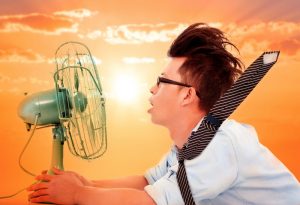 A warm summer day is a pleasant experience in Michigan. A warm, humid, summer day is much less pleasant. And a hot, humid day—that’s when people stay indoors and crank up their ACs.
A warm summer day is a pleasant experience in Michigan. A warm, humid, summer day is much less pleasant. And a hot, humid day—that’s when people stay indoors and crank up their ACs.
Why does humidity make it feel like it’s much hotter than it is? We all know the feeling of a damp and muggy day, but is the humidity actually making it hotter outside?
Humidity and Body Heat
First, humidity doesn’t raise the temperature of the air. An 80°F day is still 80°F, no matter if the relative humidity level (the percentage of water vapor saturated in their air) is a dry 30% or a humid 80%. What humidity does is make you feel hotter. If you look at weather measurements, you may see something like this: “80°F. Feels like 85°F.” That’s describing the effect of humidity as well as wind chill (if any) on how the temperature feels.
The reason high levels of moisture vapor in the air make you feel hotter is that this moisture traps heat in your body. Your body continually loses heat to the air to cool it down. It does this through perspiration. When humidity levels are high, the air is more saturated with water, and it’s tougher to release heat through perspiration. Heat leaves your body slower and the air around you feels hotter.
In fact, it’s not much different than the way a blanket makes you feel warmer when it’s cold: its trapping heat. So think of humidity as like throwing on blanket during a hot day! Not pleasant.
(Humidity works in reverse in cold temperatures. Low humidity allows heat to escape faster from the body, and that makes a cold day feel even colder.)
Beating the Humidity Indoors
There isn’t much you can do about humidity outdoors. Fans can help because they remove the heat envelope around your skin and allow a bit more body heat to escape.
In your home, however, there are ways to lower humidity levels to an ideal balance between “too humid” and “too dry.” (For most people, this is around 45% relative humidity.) A special whole-house dehumidifier can be integrated into the HVAC system to work with the air conditioner. An AC does have some dehumidification properties, but it’s not sufficient to make a difference on a day when the relative humidity rises above 60%, the point where it starts becoming uncomfortable. What a whole-house dehumidifier does is evaporate refrigerant that causes moisture to condense. This removes some of the vapor from the air and lowers the humidity. It also cools off the air, which could potentially interfere with the air conditioner and make the home’s air too cold. A dehumidifier prevents this by using a heating element to re-heat the dehumidifier air to its original temperature.
You can precisely control the humidity levels through a control panel called a humidistat. Installers can integrate the humidistat into a new thermostat so you have complete control over indoor climate conditions.
For Fenton, MI dehumidifier service to balance your home’s humidity, talk to one of our HVAC professionals today.
Beat the humidity with First Choice Heating & Cooling. If your home had a voice, it would call First Choice!
